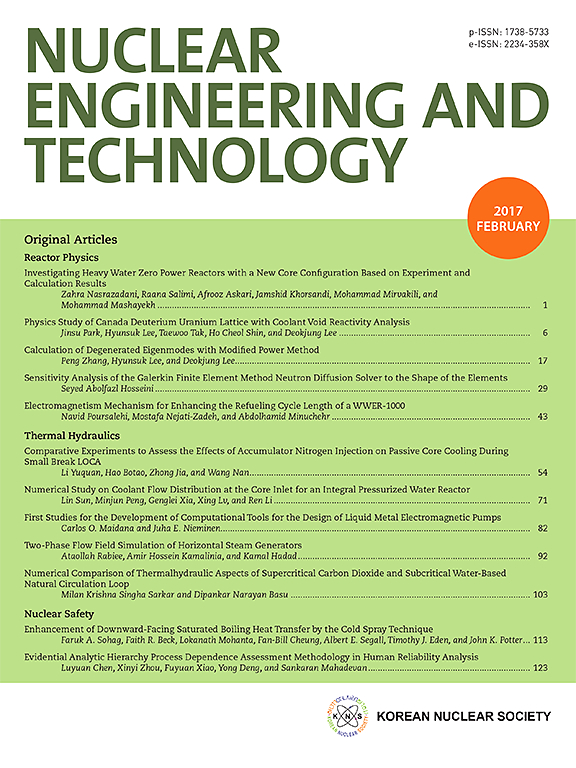一种新型伽马射线防护玻璃材料:彻底分析确定添加氧化钆(III)的影响
IF 2.6
3区 工程技术
Q1 NUCLEAR SCIENCE & TECHNOLOGY
引用次数: 0
摘要
本研究介绍了用三氧化二硼替代二氧化铅和氧化钆 (III) 对 BO-NaO-ZnO-PbO-GdO 玻璃体系的物理、机械和辐射屏蔽性能的影响。阿基米德法证实,在制造的玻璃体系中,氧化铅+氧化钆的浓度在 16 至 22 摩尔%的范围内增加,会使制造的玻璃样品的密度从 4.052 克/厘米增加到 4.408 克/厘米。此外,还利用 Makishima-Mackenzie 模型研究了 PbO+GdO 对所研究玻璃样品机械性能的影响。随着 PbO+GdO 替代量的增加,玻璃样品的机械性能和微硬度都有所下降。此外,还采用蒙特卡罗模拟法估算了 PbO+GdO 浓度对制备样品辐射屏蔽参数的影响。随着 PbO+GdO 浓度范围(16、18、20 和 22)的增加,线性衰减系数(LAC)在 0.06 MeV 时分别增加到 8.014-11.517 厘米,在 0.6 MeV 时分别增加到 0.381-0.423 厘米,在 5 MeV 时分别增加到 0.133-0.149 厘米,在 15 MeV 时分别增加到 0.132-0.154 厘米。因此,PbO+GdO 浓度的引入增强了制备的玻璃样品的辐射屏蔽性能,使其适用于γ 射线屏蔽应用。本文章由计算机程序翻译,如有差异,请以英文原文为准。
A new protective glass material against gamma ray: Thorough analysis to determine the impact of adding gadolinium (III) oxide
This work presents a study of the effect of replacing lead dioxide and gadolinium (III) oxide with boron trioxide on the physical, mechanical, and radiation shielding properties for the B2O3-Na2O-ZnO-PbO2-Gd2O3 glass systems. The Archimedes method confirms that the increase in the PbO2+Gd2O3 concentration within the fabricated glass system in the range from 16 to 22 mol.% increases the fabricated glass samples' density from 4.052 to 4.408 g/cm3. Additionally, the Makishima-Mackenzie model was utilized to investigate the influence of PbO2+Gd2O3 on the mechanical properties of the investigated glass samples. The increase in the substituting of PbO2+Gd2O3 decreases the fabricated glass samples' mechanical properties and micro-hardness. Furthermore, the Monte Carlo simulation method was applied for the estimation of the impact of PbO2+Gd2O3 concentration on the fabricated samples' radiation shielding parameters. The increase in the concentration of PbO2+Gd2O3 with range of (16, 18, 20 and 22) leads to increase the linear attenuation coefficient (LAC) to 8.014–11.517 cm−1 at 0.06 MeV, 0.381–0.423 cm−1 at 0.6 MeV, 0.133–0.149 cm−1 at 5 MeV, and 0.132–0.154 cm−1 at 15 MeV with the same order, respectively. Therefore, the introduction of PbO2+Gd2O3 concentration enhances the fabricated glass samples' radiation shielding properties to be suitable for γ-ray shielding applications.
求助全文
通过发布文献求助,成功后即可免费获取论文全文。
去求助
来源期刊

Nuclear Engineering and Technology
工程技术-核科学技术
CiteScore
4.80
自引率
7.40%
发文量
431
审稿时长
3.5 months
期刊介绍:
Nuclear Engineering and Technology (NET), an international journal of the Korean Nuclear Society (KNS), publishes peer-reviewed papers on original research, ideas and developments in all areas of the field of nuclear science and technology. NET bimonthly publishes original articles, reviews, and technical notes. The journal is listed in the Science Citation Index Expanded (SCIE) of Thomson Reuters.
NET covers all fields for peaceful utilization of nuclear energy and radiation as follows:
1) Reactor Physics
2) Thermal Hydraulics
3) Nuclear Safety
4) Nuclear I&C
5) Nuclear Physics, Fusion, and Laser Technology
6) Nuclear Fuel Cycle and Radioactive Waste Management
7) Nuclear Fuel and Reactor Materials
8) Radiation Application
9) Radiation Protection
10) Nuclear Structural Analysis and Plant Management & Maintenance
11) Nuclear Policy, Economics, and Human Resource Development
 求助内容:
求助内容: 应助结果提醒方式:
应助结果提醒方式:


